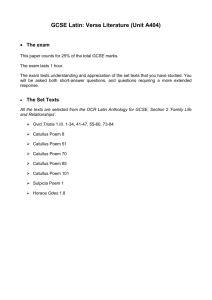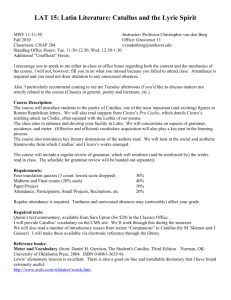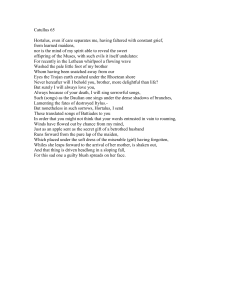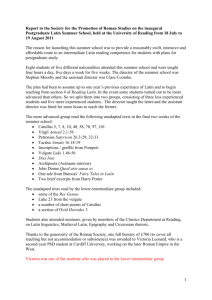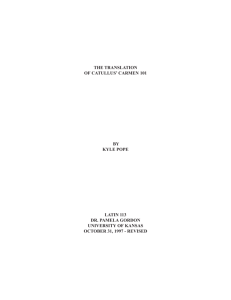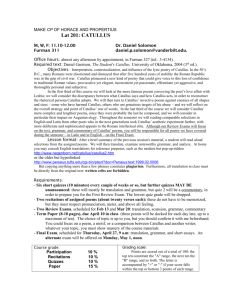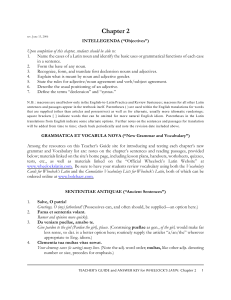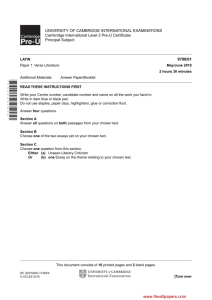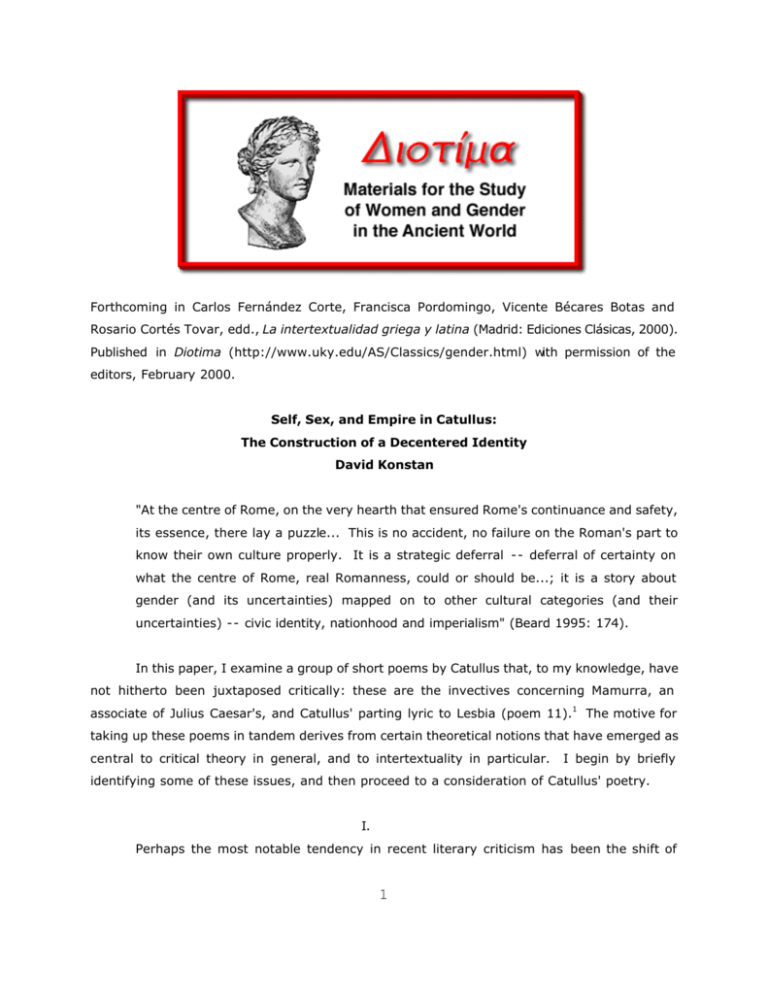
Forthcoming in Carlos Fernández Corte, Francisca Pordomingo, Vicente Bécares Botas and
Rosario Cortés Tovar, edd., La intertextualidad griega y latina (Madrid: Ediciones Clásicas, 2000).
Published in Diotima (http://www.uky.edu/AS/Classics/gender.html) with permission of the
editors, February 2000.
Self, Sex, and Empire in Catullus:
The Construction of a Decentered Identity
David Konstan
"At the centre of Rome, on the very hearth that ensured Rome's continuance and safety,
its essence, there lay a puzzle... This is no accident, no failure on the Roman's part to
know their own culture properly. It is a strategic deferral -- deferral of certainty on
what the centre of Rome, real Romanness, could or should be...; it is a story about
gender (and its uncertainties) mapped on to other cultural categories (and their
uncertainties) -- civic identity, nationhood and imperialism" (Beard 1995: 174).
In this paper, I examine a group of short poems by Catullus that, to my knowledge, have
not hitherto been juxtaposed critically: these are the invectives concerning Mamurra, an
associate of Julius Caesar's, and Catullus' parting lyric to Lesbia (poem 11).1 The motive for
taking up these poems in tandem derives from certain theoretical notions that have emerged as
central to critical theory in general, and to intertextuality in particular.
I begin by briefly
identifying some of these issues, and then proceed to a consideration of Catullus' poetry.
I.
Perhaps the most notable tendency in recent literary criticism has been the shift of
1
attention to what we may call the social periphery. Instead of concentrating exclusively on the
literary production of Europe and, more recently, the United States, critics are increasingly
looking to the third world and other regions on the geographical perimeter. The study of black
literature and that of other marginalized ethnic groups has come into its own; working-class
writing, literature produced in prison, and popular or folk art forms are central areas of
investigation. Similarly, poetry and prose are no longer regarded as chiefly a masculine preserve,
as women's literature, along with gay and queer writing, have become the focus of interest in
their own right. So too, the exclusive attention to selected epochs of high art, such as fifthcentury Athens or Augustan Rome, has opened up to include such ostensibly barren periods as
late antiquity or the middle ages. Correspondingly, within the core body of literature, voices
representing these fringe territories have been heard.
The categories by which some literatures or literary positions have been privileged while
others have been excluded readily assume the form of polar oppositions, in which one extreme is
valorized while the other is devalued. The axes along which power relations are aligned include
the familiar inventory of gender, sexuality, race, class, and nationality.
The list is not
exhaustive, of course. Eve Kosofsky Sedgwick (1990: 22) observes: "A tiny number of inconceivably coarse axes of categorization have been painstakingly inscribed in current critical and
political thought: gender, race, class, nationality, sexual orientation are pretty much the
available distinctions"; but, she adds, a whole host of less articulated roles, including family,
friends, and relations at work or at play, "prove that even people who share all or most of our
own positionings along these crude axes may still be different enough from us, and from each
other, to seem like all but different species." Recently, Peter Parsons, in a review of a book on
ancient Athenian appetites by James Davidson entitled Courtesans and Fishcakes, remarks
crisply on the tendency to reduce classical social relations to paired dominant and subordinate
roles: "A society must be more than the sum of its polarities" (1997: 7).
Nevertheless, these roles enter crucially into the formation of a personal sense of self. In
his recent book, Tragedy in Athens, David Wiles lists the self among the four categories that
have "fragmented in the post-modern era." "The c oncept of an autonomous ego," Wiles writes,
"has collapsed, as the self seems to be compounded of a network of acquired discourses" (1997:
14). François Lyotard, the prophet of postmodernism, notes: "A self does not amount to much,
but no self is an island; each exists in a fabric of relations that is now more complex and mobile
than ever before. Young or old, man or woman, rich or poor, a person is always located at
'nodal points' of specific communication circuits, however tiny these may be" (1988: 15).2
Behind these metaphorical expressions, there is the image of the individual as the
2
intersection of an indeterminate number of lines which represent the various elements that enter
into our personal identities. But it is not just a matter of convergence, like radii meeting at a
mid-point, since the several axes are organized hierarchically, with positive and negative values
defining the limits of each spectrum. Our individual coordinates in the system can be very messy
and complex. If there is a center in this picture, it will be the place at which all the termini of
privilege coincide, thus endowing this particular location with exceptional prestige: it is with
respect to this center that the excluded categories we noted a moment ago are imagined as
occupying the periphery.3 The dominant values, moreover, are mutually reinforcing. In a recent
essay entitled "'Beyond' Gynocriticism and Gynesis: The Geographics of Identity and the Future
of Feminist Criticism," Susan Stanford Friedman (1996: 18) writes: "One axis of identity, such as
gender, must be understood in relation to other axes, such as sexuality and race"; Friedman
advances what she terms a "new geography of identity" (22), in which "interactional analysis of
codependent systems of alterity replaces the focus on binary difference," and invites critics to
examine whether such systems, when they co-exist in a text, clash or else "intensify each other
in collaboration" (26).
Systems of values are not timeless; rather, the vectors of entitlement, such as skin color
or sexual orientation, vary from one society to another. One consequence of the concentration
on a canon of literature representing a limited set of socially sanctioned subject positions has
been to create the image of a single voice that seems universal and transhistorical. An individual
text, however, represents a particular constellation of tensions within the general horizons of a
given culture. The task of historical criticism is both to make visible the paradigms of privilege
specific to the times, and indicate how the place occupied by a particular writer contributes to
fortifying or destabilizing the dominant value system.
II.
No form of literature seems more personal and at the same time more universal than lyric
poetry. All of us hate, fear, fall in love, grieve, and feel pity, whether today or two thousand
years ago. The evidence of this community of sensibility, which constitutes us all as members of
the human race, is just the enduring and direct appeal of an ancient poet like Catullus: we
suppose that we feel just as he did. The task of critical theory is to disengage the elements
that enter into the composition of the work of art, picking apart, if I may put it so, the separate
strings of the lyre that seem to pulse in unison, and show how their harmony is the product of a
way of looking that is both characteristic of the poet's world and, at the same time, a reflection
of his or her specific angle of vision.
We may begin with one of the poems (115) concerning Mamurra, a lieutenant of Julius
3
Caesar's, to whom Catullus sometimes refers by the nickname Mentula, "Prick" or "Cock":
Mentula habet instar triginta iugera prati,
quadraginta arvi, cetera sunt maria.
cur non divitiis Croesum superare potis sit,
uno qui in saltu tot mo da possideat,
prata, arva, ingentis silvas saltusque paludesque
usque ad Hyperboreos et mare ad Oceanum?
omnia magna haec sunt, tamen ipsest maximus ultro,
non homo sed vero mentula magna minax.
Cock has close on thirty acres of pasture,
forty of ploughland: all the rest is swamp.
How can he fail to surpass Croesus with his riches,
when in one estate he possesses so many good things,
pasture, ploughland enormous woods and vast lakes,
as far as the Hyperboreans and the sea of Ocean?
All this is great, but the greatest of all is the owner,
no ordinary man, but in fact a mighty menacing cock. 4
The poem has clever stylistic effects (e.g., the hypermetrical fifth line suggesting excess),5 but
the basic point is that although Mamurra is rich in the variety of his holdings in land, his personal
dimensions exceed those of his property. Part of the meaning depends, perhaps, on an echo of
poem 114, with which it apparently forms a doublet; there Catullus asserts that Mentula's
expenses exceed the income derived from his estates (fructus sumptibus exsuperat, 114.4).
But in c. 115, the joke plainly resides in taking the name "Mentula" literally, and thus imagining
Mamurra's penis as larger than his acreage. But why is this funny, or, more generally, what does
it mean for Catullus to have reduced Mamurra to a single feature, namely his genitals, by the
figure of synecdoche or pars pro toto, and then compared the size of this attribute to that of
his landed property?
A large sexual organ is sometimes taken today as a sign of healthy masculinity, but in
classical antiquity it commonly represented rather the bestial exaggeration of sexual appetite
associated with figures such as Priapus, who was customarily depicted as macrophallic.6
Mamurra is thus caricatured as a figure of hyperbolic craving, in the first instance for sex, but
also, by analogy, for possessions in general. The effect of this extreme passion is that he is the
4
consummate consumer, who forever exceeds the resources, however great, that he may have at
his command. His perennial demand renders him poor in the midst of his wealth; as Catullus puts
it in c. 114, "let him be rich, provided he lacks everything" (concedo sit dives, dum omnia desint,
114.5).
There is, however, a further consequence of his state of need. To meet his outlays,
Mamurra must continually acquire more land, which is the chief symbol and substance, in
aristocratic Roman culture, of affluence. Here we have the explanation of the perplexing detail
that, although Mamurra is described as potentially surpassing Croesus in fortune, his holdings of
thirty iugera of meadow, forty of arable, and some comparable though unspecified quantity of
shore property, do not in fact constitute a particularly opulent domain.7 If Mamurra's longings
were moderate, Catullus seems to suggest (in the philosophical spirit of Horaces' Satires), he
would indeed be richer than Croesus with the possessions he has, for they would be sufficient
for all his requirements.8 But Catullus proceeds to inflate wildly the ext ent of Mamurra's estates,
suggesting that they extend northwards to the mythical territory of the Hyperboreans and
westward to the Atlantic Ocean. Since Mamurra's appetites are limitless, no amount of land,
even if it were the size of Rome's entire empire, can satisfy them. Mamurra cannot ever have
enough, which is why he is not just a wastrel, but rapacious as well: he must always be adding
more to compensate for what he has squandered.9
In poem 29, Catullus hammers home the description of Mamurra's extravagant expenses
and predatory greed, which, he alleges, are fed by the spoils of Julius Caesar's campaigns in Gaul
and Britain:
quis hoc potest videre, quis potest pati,
nisi impudicus et vorax et aleo,
Mamurram habere quod Comata Gallia
habebat ante et ultima Britannia?
cinaede Romule, haec videbis et feres?
et ille nunc superbus et superfluens
perambulabit omnium cubilia
ut albulus columbus aut Adoneus?
cinaede Romule, haec videbis et feres?
es impudicus et vorax et aleo.
eone nomine, imperator unice,
fuisti in ultima occidentis insula,
ut ista vostra diffututa Mentula
5
ducenties comesset aut trecenties?
quid est alid sinistra liberalitas?
parum expatravit an parum elluatus est?
paterna prima lancinata sunt bona,
secunda praeda Pontica, inde tertia
Hibera, quam scit amnis aurifer Tagus.
timentque Galliae hunc, timent Britanniae.
Quid hunc malum fovetis? aut quid hic potest
nisi uncta devorare patrimonia?
eone nomine, urbis o potissimi,
socer generque, perdidistis omnia?
Who can see this, who can stand this,
unless lost to shame and a glutton and a gambler,
Mamurra in possession of what long-haired Gaul
and fathest Britain once possessed?
Pansy Romulus, can you see and stand this?
And is he now, overbearing and overwealthy,
to prance around everyone's marriage-bed,
like a lily-white dove or the god Adonis?
Pansy Romulus, can you see and stand this?
Then you're lost to shame and a glutton and a gambler.
Was it on this account, O general without peer,
that you found yourself in the farthest island of the west,
in order that that debauched tool of yours
might get through twenty or thirty million?
What is misplaced generosity if not this?
Hasn't he lechered away enough or wasted enough on gluttony?
First his patrimony was dissipated,
then his Pontic loot, and thirdly
that from Spain, of which the gold-bearing Tagus can tell.
Is this the man who has the pickings of Gaul and Britain?
Why the devil do you pamper him, the two of you?
And what can he do except swallow tidy fortunes?
6
Was it on this account, most honourable men of Rome,
father- and son-in-law, that you ruined the world?
The motive for the apparently exaggerated claim in c. 115 that Mamurra's possessions extend to
the Hyperboreans and the Atlantic Ocean is revealed in c. 29: Mamurra in fact acquired
properties in Pontus (where Pompey waged war in 64-63 B.C.) and Spain (after Caesar's
campaign in 61 B.C.), and is now preparing to pillage the territories newly conquered by Caesar.
Catullus leaves it unclear whether Mamurra is seeking to appropriate estates or simply extract
booty; the ambiguity is natural, since land, in the poems concerning Mamurra, is the principal
figure for wealth of any kind. What is more, it also enables the identification of Mamurra's
private holdings with the physical territory brought under Roman control by its imperialist wars,
and Catullus goes so far as to suggest that the greed and straitened circumstances of lecherous
spendthrifts like Mamurra may be the chief motive for the military campaigns undertaken by
Caesar and Pompey.
The logic of these associations is clear enough: Mamurra has played the dandy and made
sexual conquests by eating up his patrimony, and will be able to maintain his habits thanks to
the loot brought in by Rome's generals. On a pyschological level, moreover, sexual dissipation
and economic waste may be seen as related kinds of behavior, involving an imprudent and
acquisitive materialism. The connection between erotic excess and an immoderate desire for
gain forms part of the classical rhetorical tradition concerning the character of tyrants, for
example, who are represented as confiscating the possessions of their subjects and debauching
their wives and children (e.g., Euripides Suppliant Women 445-55, etc.). As Catharine Edwards
puts it (1993: 5): "For Romans, luxury and lust were cognate vices." The idea depends on an
understanding of virtue as self-control and a respect for limits; on this conception, which was
founded on popular morality and elaborated systematically by the Greek philosophers, the
essential form of vice is self-indulgence, akrasia or incontinentia (cf. Edwards ibid.), and this
idea undoubtedly informs Catullus' attitude. Of course, an addiction to sex might also impede
the passion for riches and vice versa, but the two drives were seen as similar in kind, in a way
that is not, for example, characteristic of what is called the Protestant ethic.10
As we have seen, however, Catullus does not treat avarice as an independent motivation
in his depiction of Mamurra, but makes it a consequence of his erotic appetite.
More
importantly, Catullus exploits the role of land as the prime expression of aristocratic wealth, and
the fact of Rome's extraordinary territorial expansion occurring at the very moment, in such a
way as to equate Mamurra's own holdings with the expanse of the Roman empire itself. In c.
115, moreover, Catullus adapts the conventional association between exorbitant erotic passion
7
and oversized sexual organs in order to represent Mamurra as a great penis equal to the extent
of his estates and consequently of Rome.
Metaphorically, the Roman empire is both
overshadowed by and identified with one enormous phallus.
Let us plot the several motifs we have elicited in accord with the critical model we
discussed at the beginning, that is, by imagining the several intersecting axes of opposition as
spokes that fan out from and define a midpoint. Geographically, the city of Rome occupies the
center; at the periphery are the territories that Rome has pacified in a series of great campaigns
in the east, west, and north: Pontus, Spain, Gaul, and Britain.11 The locus of power, which is of
course unevenly distributed, is in the heartland rather than in the outlying provinces. Another
axis is constructed on the contrast between Mamurra's decadent wastefulness and the
traditional Roman ideal of parsimony, which dictated that one preserve intact and, if possible,
augment one's patrimony.
An empire managed by sober patresfamilias, we are given to
understand, would work to the favor not only of Roma ns themselves but also of the subdued
populations, who would not suffer the pillaging that enables the prodigality of Caesar and his
henchmen. On this radius, the center is corrupt rather than powerful: on the ordered scale of
values, it has a negative valence. Finally, on the sexual spectrum, the center, as occupied by
types like Mamurra, is hyperphallic, but this sign of excessive male sexuality is treated not as an
emblem of commanding or authoritative status but rather as a figure for the financial and erotic
dissipation of a man who ruins his estate in order to gain access to women's bedchambers.
Under the dispensation of Caesar, Pompey, and their lackeys, Roman military might is associated
both with a complete absence of moderation or self-control and with an extreme hypertrophy of
the phallic function.
This tension between the military supremacy of the center and its moral corruption is a
commonplace of the Roman moralistic tradition. Catharine Edwards cites a remark of Seneca's
that illustrates the conundrum in spatial terms:
M. Cato Censorius, quem tam e republica fuit nasci quam Scipionem, alter enim
cum hostibus nostris bellum, alter cum moribus gessit.... (Ep. Mor. 87.9)
Marcus Cato the Censor, whose life was of as much benefit to the state as that
of Scipio, for while Scipio waged war on our enemies, Cato waged war on our
morals.... (tr. Edwards 1993: 1)
As Edwards explains (p. 2): "While Romans fought foreigners on the margins of their empire...,
they also attacked their fellow citizens at the empire's centre." But if Rome is immoral enough to
8
require such a parallel campaign, its superiority to the peripheral populations may be called into
question: hence the widespread image of noble tribes dwelling beyond Rome's reach and
uncorrupted by Rome's depravity.
A complicating element in this scheme, however, is the insult to Caesar as cinaede
Romule (5, 9). If cinaedus is not being used simply as a generalized term of abuse, the passive
sexual role it connotes would appear to be at odds with the hyperphallic character of Mamurra,
inasmuch as Greek and Roman erotics was predicated on a radical disjunction between the
active lover (erastês, amator) on the one hand, and the receptive beloved (erômenos/ê,
amatus/a) on the other; this opposition was aligned with the division of power roles, and for a
free adult male to be sexually penetrated represented a loss of status equivalent to a reduction
to the social condition of slave, woman or child. As Marilyn Skinner (1979: 142) puts it, "the
adult male who allows himself to be used as the passive partner automatically becomes
womanish and despicable." Yet Catullus does not seem in this poem to be depicting Caesar as
worse than Mamurra. Mamurra's depravity is taken as given; the rhetorical questions addressed
to Caesar suggest that Catullus had at least entertained the hope of better things from him,
whatever his sexual proclivities.
Some further light on the matter is provided by poem 57:
pulcre convenit improbis cinaedis.
Mamurrae pathicoque Caesarique.
nec mirum: maculae paris utrique,
urbana altera et illa Formiana,
impressae resident nec eluentur,
morbosi pariter, gemelli utrique
uno in lectulo, erudituli ambo,
non hic quam ille magis vorax adulter,
rivales socii puellularum.
pulcre convenit improbis cinaedis.
Those shameless fairies are finely matched,
pansy Mamurra and Caesar.
And no wonder: similar stains,
one a city dye, the other a dye of Formiae,
are stamped upon the pair and never will be washed
Tainted alike they are, a pair of identical twins,
9
away.
two dilettante pedants on a single study-couch,
one as greedy an adulterer as the other,
rival partners in their pursuit of girls.
Yes, those shameless fairies are finely matched.12
Both Caesar and Mamurra are identified as cinaedi and pathici; they share the same bed (or
couch: lectulus), and are also rivals in the pursuit of married women and young girls, presumably
virgins. Clearly, the division between active and passive sexual roles is not the operative factor
here; perhaps for that reason, two men identified as cinaedi can be imagined as sleeping
together, with the apparent implication that they have sex with one another (I do not imagine
the point to be that they bring home to their single bed the women they seduce). If the picture
is as I have suggested, it is a remarkable example of the collapse of the usual dimorphism in
homoerotic relations (the differentiation between the roles of lover and beloved) as conceived in
classical antiquity, and exceptional even for Catullus. Marilyn Skinner comments (1979: 143)
that "the lampoon invests the alleged liaison with a perverse egalitarianism, symbolic of the
unanimity of purpose characteristic of Caesar and Mamurra's working association." I would say
rather that on the axis that Catullus is projecting here, phallic aggression, whether on the part
of Mamurra or of Caesar, and the passive role of the catamite are two sides of the same coin
(one is reminded of C. Curio's quip about Caesar reported by Suetonius [52.3]: "every woman's
husband and every man's wife"). Opposed to both extremes, one must suppose, is the posture
of sexual restraint that avoids the hyperphallic and the anal-receptive roles. It remains to be
considered what implications this negation of the traditional erotic polarity may have for a notion
of amatory reciprocity.13
In the poems concerning Mamurra, then, Catullus puts into play a set of hierarchically
valorized oppositions that are grounded in the classical structure of values but are not simply the
direct reflection of some fixed and inalterable ideological matrix. Mamurra is the hub of a series
of polarized rays that construct him as a spendthrift who compensates for his losses by
rapaciousness, as an erotically depraved individual who is both overly phallic and sexually
passive, and as a figure for Roman imperialism itself, both insofar as the degeneracy he
incarnates is offered as the reason why Caesar and others have embarked on wars of plunder,
and because his holdings in land, and by synecdoche he himself and more particularly his sexual
organ with which he is identified, are imagined as coextensive with the vast expanse of the
empire. The center of power, and indeed the entire world it commands, are constituted on the
basis of an erotic domination and subordination that are twin expressions of a divided,
passionate and transgressive self.
10
III.
Where does all this leave Catullus? At around the same time that he was composing the
poems on Mamurra, Catullus wrote the famous farewell poem to Lesbia in the sapphic me ter (c.
11):
Furi et Aureli, comites Catulli,
sive in extremos penetrabit Indos,
litus ut longe resonante Eoa
tunditur unda,
sive in Hyrcanos Arabasve molles,
seu Sagas sagittiferosve Parthos,
sive quae septemgeminus colorat
aequora Nilus,
sive trans altas gradietur Alpes,
Caesaris visens monimenta magni,
Gallicum Rhenum horribilesque ultimosque Britannos,
omnia haec, quaecumque feret voluntas
caelitum, temptare simul parati,
pauca nuntiate meae puellae
non bona dicta:
cum suis vivat valeatque moechis,
quos simul complexa tenet trecentos,
nullum amans vere, sed identidem omnium
ilia rumpens;
nec meum respectet, ut ante, amorem,
qui illius culpa cecidit velut prati
ultimi flos, praetereunte postquam
tactus aratro est.
Furius and Aurelius, ready to accompany Catullus,
whether he plans to penetrate to the distant Indians,
where the shore is pounded by the far-resounding
wave of the orient
or to the Hyrcani and the luxurious Arabs
11
or the Sacae and the quivered Parthians
or the plains that are dyed by the flooding of
the sevenfold Nile,
or whether he plans to march over the mountainous Alps,
viewing the places that tell of mighty Caesar,
the Gallic Rhine, and also the horrible Britons
at the world's end-ready as you are to face all these hazards with me,
whatever the will of heaven above will bring:
take back to my sweetheart a brief
and not kind message.
Let her live and be happy with her lovers,
three-hundred of whom at once she holds in her
embraces,
loving none truly but again and again rupturing
the loins of them all;
and let her not count on my love, as in the past,
for through her fault it has fallen like a flower
at the meadow's edge, after being lopped
by the passing plough.
Unlike the poems on Mamurra, c. 11 has received an enormous amount of attention from
scholars. In large measure, critics have focused on the function of the long preamble in which
Catullus apparently celebrates the readiness of his chosen messengers, Furius and Aurelius, to
follow him to the ends of the earth; this section has seemed exaggerated in relation to the brief
and bitter lines of the two concluding stanzas. The role of Furius and Aurelius has seemed all
the more odd insofar as other poems by Catullus treat the pair with decided suspicion, not to
say downright hostility.14 My object here is not to defend once more the ostensible unity of the
poem, in part because I do not consider unity to be a well-defined aesthetic concept, nor to
situate it in some imaginary reconstruction of Catullus' relationship with Lesbia or with his two
companions, Furius and Aurelius, although his representation of them in other poems will indeed
prove relevant. Rather, I attend to the thematic elements that c. 11 shares with the poems
concerning Mamurra, a connection that has not, to my knowledge, been hitherto examined, and
which, I believe, helps us to understand how Catullus constructs for himself a particular subject
position in a world of erotic aggression and imperialism.
12
That the verb penetrare (and perhaps also temptare) suggests sexual assault, and
characterizes the conquered peoples at the boundaries of the Roman empire as femininized, has
been observed by others.15
The question remains, however, why Catullus should have
introduced this dimension of Roman imperialist ideology so emp hatically into this poem, the
ostensible purpose of which is to terminate his relationship with Lesbia. The Mamurra poems, as
we have seen, provide a link between sexuality and empire, associating the drive to territorial
expansion with the loose behavior of the elite class at Rome, including both erotic comportment
and the extravagant expenditures which consumed inherited wealth. In his attacks on Mamurra
and Caesar, Catullus simultaneously accuses the pair both of phallic aggression in regard to
married matrons and girls and of pathic receptivity.
Catullus thereby blurs the traditional
distinction between behavior appropriate to men and that of women or, in a pederastic context,
of boys. It is the perversion of both roles that characterizes the imperial center.
In other poems, Furius and Aurelius appear in the context of Catullus' relationship with a
boy, presumably the same to whom he gives the name Juventius (Aurelius: 15, 21; Furius: 24.8
with 23.1). Catullus also lampoons the poverty both of Furius (23, 26) and of Aurelius (21),
whom he describes as the "father of hungers" (21.1); they seem, then, to belong to the same
class of wastrels as Mamurra. Finally, Aurelius and Furius appear together in c. 16, in which
Catullus responds to their inference, drawn from the character of his poems, that he is both
sexually libertine (parum pudicum, 4, cf. 8; cf. also castum and pium, 5) and effeminate
(molliculi 4, 8; male marem, 13). Catullus' rejoinder is to call them pathici and cinaedi in turn,
and to threaten to penetrate them anally and orally (16.1-2, 14). What is at stake in the
charge of "softness" is clearly not homosexuality in the modern sense of sexual relations between
two males. It is more plausible that Catullus is reacting to the accusation, based somehow on
the evidence of his poetry, that he has played the passive role in a sexual relation. This is the
slur he levels in turn against Aurelius and Furius, and which he backs up with the promise that he
will compel them to submit to forcible entry; the joke, of course, is that such aggression on
Catullus' part would violate his parallel claim to chaste and respectful behavior. Here again,
phallic domination and anal or oral receptivity are paired as twin forms of depravity, admissible in
poetry (such as c. 16 itself), which is designed to titillate and amuse (16.7, 9-10), but
inappropriate in real life, which requires that even an erotic poet comport himself decently (16.56).
As an example of the kind of verse that inspired Furius' and Aurelius' calumny, Catullus
cites his own milia multa basiorum ("many thousands of kisses"), which alludes plainly to c. 5
(vivamus mea Lesbia atque amemus), dedicated to Lesbia (cf. 5.7, basia mille, with 10, milia
13
multa), though there is a possible reference as well to milia basiem trecenta (48.3), addressed
to Juventius. But why should either of these poems arouse the suspicion that Catullus' poetic
persona is effeminate? There is perhaps some basis for the inference in the Lesbia poem, in two
respects. First, Catullus lauds the mutual love between them, just as, elsewhere, he speaks of
Lesbia as loving him (the verb is amare, 92.2), whereas he never assigns to Juventius a role as
erotic subject. Second, and again in contrast to the Juventius lyrics, Catullus asks Lesbia to
kiss him rather than planting kisses himself.16 But leaving these subtleties aside, it appears that
the very nature of Catullus' relationship to Lesbia, as recounted in his verses, might seem to
reveal something delicate and less than manly to the eyes of Furius and Aurelius.
In the next -to-last stanza of c. 11, Catullus complains that Lesbia loves no one truly, but
rather seizes and crushes her innumerable adulterous partners. Although she is a woman, her
behavior resembles that which Catullus ascribes to Mamurra: like him, she is sexually predatory
and destructive. Despite Catullus' earlier illusions about her, she turns out to belong to the same
class of reckless consumers, of those who take and give nothing back, as Caesar and his
henchmen, who have extended the Roman realm for the sole purpose of feeding their limitless
appetites. In this center of empire, Catullus represents himself as having no place. The final
image, in which Catullus compares Lesbia to a plough and himself to a flower at the edge of the
field, expresses his sense of marginality, of pertaining to the periphery rather than the core. He
has not arrived at this fringe position in the company of men like Furius and Aurelius, that is, as
part of the dominant and decadent Roman nobility who have incited and directed Rome's wars
and have marched fiercely to the limits of the world, collapsing the distinction between urbs and
orbis (cf. Ovid Fasti 2.684: Romanae spatium est urbis et orbis idem).17 Rather, he simply exists
at the boundary, like the populations defeated by Rome's legions, where Lesbia's violence has
found and destroyed him. 18
Catullus' self-presentation in this poem is the product of his own marginalization, as he
perceives it, in regard to the Roman center of power. He constructs his own desire as that of
an excluded figure who is unable to participate in a world in which erotic relations are polarized
into predatory and submissive partners, both equally dissolute and indeed interchangeable, a
place where the cinaedus is a woman-chaser and a corrupter of boys and women crush men's
loins in their passion.
By locating himself at the edge of the field, Catullus projects an
alternative vision of love and simultaneously casts himself as the victim of an inexorable system,
on the model of the distant tribes that Roman armies were in the process of reducing or
exterminating.
Sexuality and the imperial organization of spatiality intersect to generate
Catullus' subject position.
They are his way of defining where and who he is; the spatial
14
imaginary informs the amatory. This is why the geographical preamble is essential to the poem.
IV.
Catullus had other ways of expressing the special character of his desire for Lesbia, such
as language drawn from the domain of parental affection (the verb is diligere, 72.3-4, 76.23) and
good will between friends (bene velle, 73.1; contrasted with amare, 72.8, 75.3). The famous
line, much admired in antiquity (it is imitated by Statius and Ausonius, among others), in which
Catullus prays that he may enjoy with Lesbia "an eternal pact of holy friendship" (aeternum
sanctae foedus amicitiae, 109.6), also appeals to the mutuality and permanence characteristic
of friendship as opposed to amatory relationships, which were commonly presumed to be both
fleeting and asymmetrical, with a possible secondary allusion to the idea of an alliance between
two states, which was called amicitia and would naturally involve a formal agreement (foedus).
If this latter overtone is there -- foedus is found already in Plautus as a term for the bond
between lovers, and may not have carried so decided a political flavor as some scholars have
supposed -- then it perhaps invokes the reciprocity typical of allies as a model for lovers, as
opposed to the image of imperial domination that Catullus associates with the erotic life of the
Roman elite.19
In an important recent study of Catullus, Micaela Janan as analyzed, or rather
psychoanalyzed, the nature of his erotic desire as divided, projecting on the one hand the image
of the ideal woman, and, on the other hand, that of woman as monstrously depraved. Making
use of Jacques Lacan's theories, Janan sees in Catullus' bifurcated passion an instance of the
permanent split in the human soul, which is grounded in our nature as desiring subjects.20 I have
tried to call attention to a different aspect of Catullus' representation of love, whereby he
sought to distance himself from the sexual dimorphism that predominantly characterized the
erotic experience of antiquity, so well described by John J. Winkler (1989) and David Halperin
(1990), and find a space, or rather a non-space, at the obliterated margin of the world, for
something different.
Catullus does not openly declare his opposition to the sexual ideology of his age. In many
poems, such as his attack on Furius and Aurelius in c. 16, he exploits the language of sexual
domination and subordination for his own ends.
But the alienation he felt from the erotic
practices of elite Roman society crossed, at a certain mo ment, with his political opposition to the
deals struck by the triumvirate of Caesar, Pompey, and Crassus, in which he saw a conspiracy to
loot the entire world in order to pay for their personal depravities. The poems addressed to
Mamurra, and the farewell poem to Lesbia, are datable to the specific year of 54 B.C., in which
Caesar crossed over from Gaul into Britain with the ambition of conquering the island, or at least
15
securing a permanent outpost there.21 But it was not just Caesar's troops that were marching.
At the same time, Pompey was waging a major campaign in the west, and Crassus was leading
an army to humble the Parthians in the east.22 Catullus' geographical references are quite
precise: Roman forces were fanning out simultaneously in all directions, and must have seemed
as invincible as the plough that Catullus imagined as clipping the accidental flower. The tone of
the poems makes it certain, in my judgment, that news of Crassus' defeat in the east had not
yet reached Rome; indeed, the failure ever to allude to so major a Roman military reversal is, for
me, one more indication that the surviving corpus of Catullus' poetry is to be dated no later than
the year 54.
In this paper, I have tried to show how the tension between diverse domains of
discourse, each structured hierarchically around relations of power, enabled the concretization of
a particular subject position that is uniquely Catullian and, at the same time, the product of a
determinate moment in Roman history.
From this perspective, discussions about whether
Catullus was a romantic, or anticipated modern or other notions of love or of the self, are beside
the point. Catullus spoke the language of his society; in this sense, the preceding analysis is
plainly historicist in nature.
But the ideology that informed his language was not a single,
coherent matrix of values controlling all thought and expression, but rather a dynamic field
constituted by criss-crossing hierarchies and potentially enabling various loci of subjectivity at
the intersections.23 Such possibilities are brought into existence by individuals or groups who
find themselves alienated from the dominant discourse (whatever its variants), or from the point
at which the valences of the several axes of power are uniformly aligned. By assuming a skewed
or oblique vision of the imperial center, Catullus could project a distinctive image of the desiring
self.
Just why Catullus, in particular, found himself dislocated in this way cannot be recovered:
perhaps it had something to do with a personal sensibility that could identify with a figure like
the abandoned Ariadne, or with his origins in provincial Verona, which had been incorporated into
the Roman republic only a generation earlier.
Biographical reconstruction at this level is
impossible and, for our purposes, immaterial. What we can perceive is how Catullus' late lyrics
bear witness to the construction of an erotic identity out of the clash and interplay of multiple
cultural discourses. Although each of these discourses is historically conditioned, the intertexts
constituted by their mutual interferences may be highly varied and complex. The example of
Catullus indicates how, on occasion, they expand the ideological horizons of an age.24
16
Bibliography
Abercrombie, Nicholas, Stephen Hill, and Bryan S. Turner. 1980. The Dominant Ideology Thesis.
London: Allen and Unwin.
Abercrombie, Nicholas, Stephen Hill, and Bryan S. Turner.
1983.
"Determinacy and
Indeterminacy in the Theory of Ideology." New Left Review 142: 55-66.
Akbar Kahn, H. 1969. "Three Epigrams of Catullus." Renard Brussels vol. 1: 3-11.
Beard, Mary. 1995. "Re-reading (Vestal) Virginity." In Richard Hawley and Barbara Levick, edd.,
Women in Antiquity: New Assessments (London: Routledge) 166-77.
Bhabha, Homi. 1994. The Location of Culture. London: Routledge.
Davidson, James.
1997.
Courtesans and Fishcakes: The Consuming Passions of Classical
Athens. New York: HarperCollins.
Dover, Kenneth J. 1978. Greek Homosexuality. London: Duckworth.
Edwards, Catharine. 1993. The Politics of Immorality in Ancient Rome. Cambridge: Cambridge
University Press.
Fernández Corte, José Carlos. 1995. "Parodia, renuntiatio amicitiae y renuntiatio amoris en
Catulo XI." Emérita 63: 81-101.
Fitzgerald, William.
1995.
Catullan Provocations: Lyric Poetry and the Drama of Position.
Berkeley: University of California Press.
Fordyce, C.J. 1961. Catullus: A Commentary. Oxford: The Clarendon Press.
Fredrick, David. 1995. "Beyond the Atrium to Ariadne: Erotic Painting and Visual Pleasure in the
Roman House." Classical Antiquity 14: 266-88.
17
Nicolet, Claude. 1991. Space, Geography, and Politics in the Early Roman Empire. Ann Arbor:
University of Michigan Press.
Parsons, Peter. 1997. "Eels Tomorrow, but Sprats Today." Review of Davidson 1997. London
Review of Books 18 September: 6-7.
Quinn, K. 1985. "Pompey, Caesar, and Catullus 29." AFLNICE 50:261-68.
Sedgwick, Eve Kosofsky. 1990. Epistemology of the Closet. Berkeley: University of California
Press.
Skinner, Marilyn B.
1979.
"Parasites and Strange Bedfellows: A Study in Catullus' Political
Imagery." Ramus 8: 137-52.
Skinner, Marilyn B. 1993. "Ego mulier: The Construction of Male Sexuality in Catullus." Helios
20: 107-30.
Therborn, Göran. 1980. The Ideology of Power and the Power of Ideology. London.
Thompson, John B. 1984.
Studies in the Theory of Ideology.
Berkeley and Los Angeles:
University of California Press.
Thomson, D.F.S., ed. 1997. Catullus. Toronto: University of Toronto Press.
Traina, Giusto.
1985.
"Terremoti e società romana.
Problemi di mentalità e uso delle
informazioni." Annali della Scuola Normale Superiore di Pisa (ser. 3) 15: 867-87.
Wiles, David.
1997.
Tragedy in Athens: Performance Space and Theatrical Meaning.
Cambridge: Cambridge University Press.
Winkler, John J.
1989.
The Constraints of Desire: The Anthropology of Sex and Gender in
Ancient Greece. New York: Routledge.
19
Winkler, John. J. 1990. "Phallos Politikos: Representing the Body Politic in Athens." Differences
2.1: 28-45.
20
Notes
1. For the tension between Catullus as love poet and Catullus as master of political lampoon,
see Skinner 1979: 137.
2.
Cf. Meskell 1997: 601: "it is not enough simply to highlight the category woman as a
monolithic group... -- too many other intersections of difference come into play, whether it be
economic or marital status, nationality, or ethnic group, and, more generally, life experience
itself"; Meskill cites Bhabha 1994: 1 for the emphasis on "an awareness of the subject positions - of race, gender, generation, institutional location, geopolitical locale, sexual orientation -- that
inhabit any claim to identity in the modern world," and endorses the application of this
perspective to ancient studies as well.
3. The image of center and periphery continues to have heuristic value, although it has been
challenged as a model of social relations in the post-modern, transnational world, in which
migration patterns may unite two distant places in a single loop; see Mountz and Wright 1996:
405: "we theorize that the space that divides San Agustín [in Mexico] and Poughkeepsie [New
York] has in many respects ceased to be."
4. All translations of Catullus are by Goold 1983, unless otherwise indicated; it should be noted
that I have not always adopted Goold's Latin text, with the result that the translation sometimes
departs slightly from the Latin version.
5. Most editors, including Goold, emend this effect out of existence.
21
6. See Dover 1978: 125-26; Winkler 1990: 28-29, 34; for an illustration of the statue of Priapus
in the House of the Vettii in Pompeii (with discussion), see Fredrick 1995: fig. 15.
7. Harvey 1979 argues that Mamurra's estate, as described by Catullus, would have constituted
a large holding by the standards of the time; contra Thomson 1997: 552, who suggests as an
alternative explanation for the small size of the estate that "Pratum and arvum are well-known
agricultural-sexual metaphors for the female pudenda." Perhaps (though I doubt their relevance
here), but this still fails to explain why Catullus should ascribe to Mentula a small number of fields
rather than a large estate.
8. The theme is, of course, an ancient one; cf. Democritus fr. 219 Diels-Kranz: "The desire for
money, if it is not limited by sufficiency [koros], is much worse than extreme poverty, for greater
desires produce greater needs."
9. Catullus' mentula magna minax echoes Ennius Annales fr. 620 Skutsch = 621 Vahlens,
machina multa minax minitatur maxima muris, and there may be some intertextual play
between the image of Mamurra's sexual organ and the battering ram that threatens city walls;
there is not context for the Ennian fragment, however, and interpretation is hazardous.
10. Hirschman 1977: 41 sees as characteristic of modern political theory the idea that "one set
of passions, hitherto known variously as greed, avarice, or love of lucre, could be usefully
employed to oppose and bridle such other passions as ambition, lust for power, or sexual lust."
22
11. The spatial imagery according to which Romans perceived themselves as occupying the
center of the world was itself an ideological construction; cf. Traina 1985; Nicolet 1991.
12. I have substituted "fairies" for Gould's "buggers," since cinaedi refers unambiguously to the
receptive partner.
13.
Thomson 1997: 340-41 observes of c. 57: "This lampoon ... perfectly illustrates the
needlessness, and indeed the impossibility, of supposing that sexual slanders ... are meant as
anything more than an elaborate form of abuse.... If one wished to reproach someone for
immoral behavior, one would of course take care not to seem implausible by accusing him
simultaneously of passive homosexuality and the seduction of other men's wives -- both of which
were standard topics of triumph verses. If, however, the real object was to express dislike of,
or opposition to, a person in the public eye, Roman custom dictated that all kinds of bizarre
charges might be added to the burden of the indictment."
Thomson fails to note that the
charges against Mamurra are cast almost exclusively in sexual terms. Catullus' abuse is carefully
constructed; his assimilation of the active and passive sexual roles is not a random barrage of
insults but a quite specific attack on the corrupt sexual practices of the Roman elite.
14. Fernández Corte 1995 argues ingeniously that the offer by Furius and Aurelius is intended to
be taken as insincere, and that Catullus' exposure of their false pretensions to friendship is thus
analogous to his rejection of Lesbia's dishonest love in the concluding stanzas. My colleague Jeri
DeBrohun reminds me that, on first hearing, one might suppose from v. 2 that Catullus himself is
preparing to penetrate the east; it is only in the last stanza that one realizes that Catullus must
be indirectly citing Furius' and Aurelius' offer, since he conceives of himself as already located at
23
world's margin.
15. E.g. Janan 1994: 64-65.
16. I discuss these poems in Konstan 2000 = Paper 3.
17. Fitzgerald 1995: 181 affirms that "Lesbia is seen as a threatening monster on the edge of
the empire, that is, beyond the pale of civilization, and also, by association with the plough, as a
manifestation of the ruthless indifference that characterizes Roman imperial might"; but if Lesbia
is at the boundary, it is because she, like Furius and Aurelius, has arrived there from the center.
Fitzgerald adds: "Bringing together the 'friends' and the lover, Catullus allows them to cancel
each other out as they merge into a generalized and indifferent violence on whose periphery he
locates, very precisely, himself" (182).
18. Greene 1997: 153 observes that Catullus "casts both Caesar's and Lesbia's conquests in a
similar light of moral degradation as against his own poetic rendering of himself as a delicate,
fragile flower that is victimized by the brutality of the world."
Carlos Fernández Corte has
suggested to me that the flower with which Catullus identifies is imagined as cut and withering
on the ground, rather than as having been crushed by the plough.
19. On foedus and related expressions in Catullus, see Skinner 1993: 118-19.
24
20. See Janan 1994: 71: "Man erects a number of conjectures around Woman. One such guess
is misogyny.... Another is courtly love.... And one can see the outlines of both cc.11 and 51
emerge as an oscillation between these two available positions."
21. On the date of c. 29, see Quinn 1985.
22. Cf. Fordyce 1961: 124.
23.
Recently, scholars sympathetic to Marxism have questioned the power of a single,
hegemonic ideology in maintaining oppression (on ideological hegemony, see Gramsci 1971: 60).
Thompson, for example, remarks (1984: 5): "It seems likely that our societies, in so far as they
are 'stable' social orders, are stabilized by virtue of the diversity of values and beliefs and the
proliferation of divisions between individuals and groups." Nicholas Abercrombie, Stephen Hill,
and Bryan S. Turner (1980: 168) have attacked the idea that a dominant set of beliefs has
caused the laboring classes to accept exploitation; compulsion, rather than ideology, is what
effects the subordination of the working class. As the same authors (Abercrombie, Hill, and
Turner 1983: 66) put it in a review of Therborn 1980, "ideology does not generally work to
incorporate subordinate classes."
24. Earlier versions of this paper were presented at Brown University and at the University of
Michigan. I wish to thank colleagues at both universities, and in particular Ruth Caston, for
helpful comments and advice.
25

